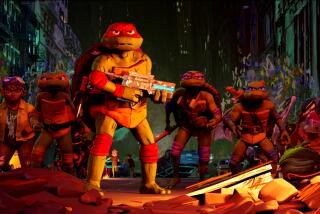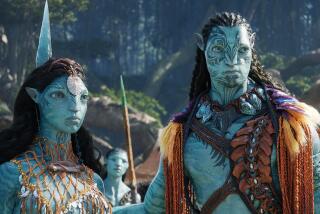Video Game Publisher Plays by Its Own Rules
- Share via
Poor THQ Inc.
The Calabasas video game publisher has never gotten much love from hard-core players for its kid-oriented, mass-market titles, which include the SpongeBob SquarePants, WWE wrestling and Tetris franchises.
But THQ’s focus on its bottom line made it a hit with Wall Street in recent years. Lately, however, the third-largest independent U.S. game publisher has been getting the brushoff from investors as well.
The troubles began in October, when Chief Executive Brian Farrell warned that holiday demand for video games would be weaker than expected. The next day, THQ’s stock plunged 36%.
Farrell turned out to be right. Game sales in the U.S. grew 10% last year, not the rosy 20% some had predicted. THQ’s profit for 2002 came in below expectations, and the company lost money in the first quarter of this year, its first quarterly red ink since 2000.
“Unfortunately,” Farrell lamented, “being right hasn’t bought us a lot.”
The company’s stock, at $18.95 on Nasdaq as of Thursday, is up 43% this year, but it’s still 20% below its price the day Farrell made his sales prediction -- even though THQ has since projected sales of at least $520 million this year and a return to profitability.
In the last few months, THQ has embarked on a campaign to regain investors’ respect and boost its stock.
“They’re the Rodney Dangerfield of the industry,” said James L. Lin, an analyst with Simba Group in San Gabriel. “I think it’s the Hollywood effect, where people are just looking at sex and sizzle.”
Unlike many of its game industry peers, THQ isn’t known for flashy parties, supercilious game developers or hyped-up titles. Many of its games get poor ratings from trade publications -- if they’re reviewed at all.
THQ’s strategy is “focused on making money, not on impressing people,” said Stewart Halpern, analyst with RBC Capital Markets in New York.
Just eight years ago, THQ found itself forced to focus on something else: averting bankruptcy. The company racked up $17.5 million in losses in 1994 on just $13.3 million in sales. Jack Friedman, who founded the firm in 1989 as T*HQ (for toy headquarters), had just left. So the board turned to Farrell, the chief financial officer at the time.
An affable man with hound-dog eyes, Farrell persuaded creditors to renegotiate THQ’s debt. And he concentrated the firm’s efforts on making inexpensive games for older consoles.
By the end of his first year as CEO, THQ eked out a $600,000 profit on $33 million in revenue. THQ has been profitable every year since in large part because Farrell zigged when the rest of the industry zagged.
While other publishers bank on home runs -- titles that sell more than 1 million copies -- THQ hits lots of singles.
“We’ve proven that you can build a business on 300,000- to 700,000-unit sellers,” Farrell said. “It has worked. It is working. And it will continue to work.”
When Sega Corp., Sony Corp. and others tackled mainstream sports games, THQ turned to wrestling, a niche sport at the time. Its wrestling games have generated $340 million in North American sales, and THQ’s titles have thrashed every rival that has tried to horn in.
Instead of big-budget shooter games with scantily clad characters, THQ has cranked out cute kids games based on popular cartoons such as “The Rugrats,” “Scooby-Doo” and “Jimmy Neutron.” Games tied to its license with Viacom Inc.’s Nickelodeon cable channel account for about 20% of revenue. “The myth is that kids’ stuff doesn’t sell,” Farrell said. “Our Scooby-Doo game sold more than a million units last year. That’s a hit.”
In recent years, the trend in games has veered toward fancy graphics with high-polygon counts, sophisticated lighting and smooth curves. THQ’s graphics aren’t known for being exceptional. But they are good enough to sell.
“They really keep an eye on the bottom line,” said Lin, who has been covering the business for more than a decade. “Sometimes, the quality of their games takes a hit because of that. But it’s a question of philosophy. Do you spend that extra $1 million to make the game look better and hope it sells more copies? Or do you spend just enough for it to break even and maybe make some money?”
That THQ generally prefers the fiscally conservative route serves the company well in a category that few others have wanted to play in: titles for Nintendo Co.’s Game Boy hand-held consoles.
“No one wanted to do Game Boy games,” Lin said. “Only THQ did it. It’s not an easy business. While you have low development costs, the cost of goods is very high because you have to pay for the cartridges. The margins are terrible. But THQ does a really good job of it because they’re great at managing inventory” and other expenses.
So good that other publishers come to THQ to develop their Game Boy titles. The result: THQ is the largest developer of Game Boy titles other than Nintendo.
“Sega chose them to make Game Boy” versions of its titles, noted Wendell South, senior entertainment software buyer for Amazon Inc., who said THQ was one of its top game vendors. “That’s pretty unique.”
Despite such success, THQ often gets overlooked. In some ways, it suffers the fate of a Boy Scout in a market that’s easily seduced by bad boys with flashy toys. For instance, Take-Two Interactive Software Inc., which created the controversial “Grand Theft Auto” games, is Wall Street’s latest darling.
“There’s no question that part of the issue for them is market misperception,” Halpern said. “Maybe to a fault, the company is focused more on running the business than on spinning Wall Street. They’ve delivered higher margins and more consistent profitability than almost everyone in the business, but their stock isn’t rewarded with industry-average multiples.”
The firm’s stock is priced at about 23 times analysts’ average earnings estimate of 82 cents a share for this fiscal year.
Now THQ, armed with $216 million in cash, has embarked on a strategy to polish its games and introduce more titles for the mature audience without abandoning its trademark fiscal discipline. Quality has “been our shortcoming up until now,” acknowledged Peter Dille, THQ’s senior vice president of worldwide marketing.
In the last couple of years, THQ acquired two development studios -- Helixe in Lexington, Mass., and Rainbow Studios in Phoenix -- rather than continuing to rely so heavily on contractors, whose quality can be unpredictable. It also hired Jack Sorensen, a respected industry veteran and former head of LucasArts, the video game arm of Lucasfilm Entertainment Co.
As head of worldwide development, Sorensen’s task is to build THQ’s in-house development talent and expand the company’s product lineup to include titles for hard-core, as well as casual, gamers.
THQ also is trying to cultivate original franchises that don’t require license fees.
This holiday season, THQ will introduce “Tak and the Power of Juju,” a franchise it co-developed with Nickelodeon, which is producing a new cartoon series featuring “Tak.”
Another test of its strategy is “Full Spectrum Warrior,” a title that drew praise from game critics and won awards at this year’s Electronic Entertainment Expo. THQ was selected among several companies vying to publish the game by Pandemic Studios , an independent developer in Santa Monica that created it as a training tool for the U.S. Army.
Pandemic developers said they chose THQ because they believed the company was straightforward and candid. Said Matthew Norton, a producer at Pandemic, “We felt we could trust THQ to market the game properly.”






